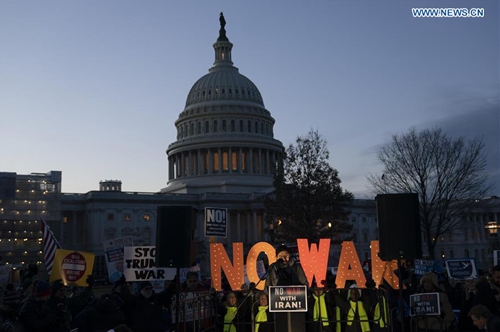HOME >> OPINION
US makes use of hybrid warfare technique to suit its interests in Mideast
By Liang Fang Source:Global Times Published: 2020/1/22 20:20:06

A rally against war with Iran is held outside the Capitol Hill in Washington DC, US, January 9, 2020. Photo: Xinhua/Liu Jie
The recent tit-for-tat confrontation between Iran and the US, during which the US killed Iranian general Qasem Soleimani and Iran retaliated by launching missile attacks on US military bases in Iraq, didn't lead to a war between the two countries. Given the confrontation between the sworn enemies, the strategic impact on the Middle East and the change in the techniques of war deserve special attention.
The US needs to regain its prestige in the Middle East. Going back on its word, Washington pulled out of the Iranian nuclear deal, which cost the US reputation, while by making contributions to the counter-terrorism fight in the Middle East, Russia, Iran and Syria have expanded their regional influence. By killing Soleimani, the US tried to prove that its writ still runs supreme in the region.
The world has returned to the era of superpower competition. Middle East has always been the center of geopolitics, thus Washington chose to strike Iran in order to increase control and influence over the Middle East and suppress Russia and Iran's sphere of influence in the region.
The targeted killing of Soleimani, to some extent, is also a test of Iran's bottom line. Since 2008, the US has significantly increased the number of strikes on targets overseas, and has repeatedly used drones against important members of the Taliban and Al Qaeda.
The US has been studying and following the style of hybrid warfare, that is, to use the "combination blow," which blends warfare with politics, economy, military, science, technology, information and internet and so on, to fight the enemies. Precision strike is one of the tools used in hybrid warfare.
The US hopes to give full play to its strong scientific and technological advantages as well as strategic deterrence, thus minimizing its own costs and losses.
After US assassinated Soleimani and Iran carried out its revenge, the Middle East has entered a new period of turmoil and chaos.
First, targeted killing may significantly expand global terrorist activities. In the name of "counter-terrorism," the US kills the military leader of another country, which seems to be a tactical victory.
But in fact, Washington has made strategic mistakes. There is no legal basis for the US to define precision strike as "overseas military operations."
The act of targeted killing means the US could wantonly define enemies and kill whoever it wants, which is very dangerous.
In addition, once the technology used in precision strike spreads or terrorists copy the model, it is likely to lead to the proliferation of global terrorist violence.
Second, the pattern of wars has undergone subversive changes. Extensive use of information, automation and intelligence are the basic patterns of future wars, and how a war could be won has changed greatly.
A war can begin or even end before traditional aircraft carriers, aircraft and other combat platforms are used. Although the US has absolute advantage over Iran in terms of military strength, that doesn't mean Iran doesn't have the capability to fight back. Iran has been able to launch strikes at US military facilities in the Middle East with drones or missiles. It could also employ network technology to attack the US in the fields of military, finance and so on.
Therefore, in the foreseeable future, Iran and the US will wrangle with each other not only in traditional battlefield, but also in a wide range of areas.
Third, the chaos in the Middle East may be long-lasting. A series of recent US actions reflect its new understanding of the value of the Middle East. Major-power competition in the Middle East has made the region unstable. The sense of crisis felt by the US that compels it to act could bring about more uncertainties in the region.
Currently, as seen from the scope and intensity of Iran's revenge, Tehran doesn't want to escalate its tensions with Washington into a war. Therefore, Iran had exercised restraint. However, the US-Iran friction in the Middle East will last for a long time.
One certain thing is that no matter what kind of military actions the US takes in the future, it will not change the general trend of win-win cooperation and common development in today's world. Overreliance on military force will not enable the US to achieve its goal, but could only make the country more isolated, more unpromising and unaccepted in the future.
The author is a professor of National Defense University of People's Liberation Army. opinion@globaltimes.com.cn
Posted in: VIEWPOINT